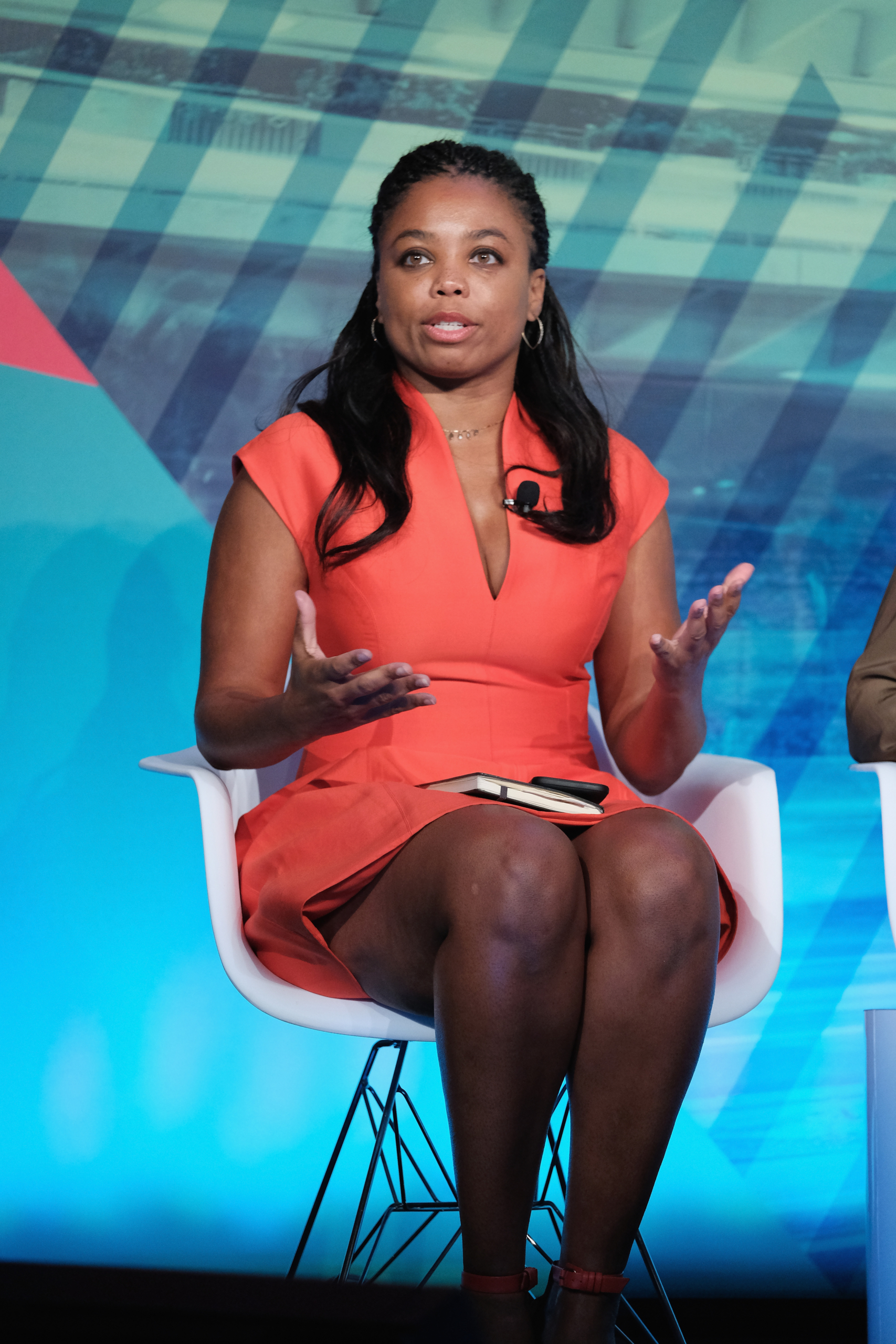Sign up for The Media Today, CJR’s daily newsletter.
The controversy around ESPN Anchor Jemele Hill took an unexpected turn Thursday evening: Three days after Hill called President Donald Trump a “white supremacist” on Twitter, ThinkProgress reporter Lindsay Gibbs reported that the network tried to “keep Hill off the air on Wednesday evening.” Gibbs reported that producers contacted two other black ESPN hosts who declined to fill in, and co-host Michael Smith refused to do the show without Hill. ESPN denied the story.
“I talked to my boss immediately. We knew it was a big story and we had to get it right,” Gibbs tells CJR. The story, which she wrote with help from ThinkProgress Editor in Chief Judd Legum, drew around 500,000 pageviews.
ICYMI: Jemele Hill on being black, female, young – and on the sports page
Gibbs published a follow-up story today because, she says, “it was important to expand on our initial reporting and also to address ESPN’s widely spread post-publication statement, which we felt was misleading.” The statement from ESPN read: “We never asked any other anchors to do last night’s show. Period.” The story explains that while no anchor was asked to fill in, other anchors were asked about “their availability for the 6:00 p.m. show.”
CJR talked with Gibbs about the process of breaking the story on the national stage, what women face in sports media, and her own feelings about the Jemele Hill controversy. The interview has been edited for clarity and length.
***
There were two things a lot of people were thinking when they first heard the story: ESPN did what? And then, who broke the story? I’m just being honest.
Ha, you are not offending me!
It was surprising partially because you all are based in DC and ESPN is based in Bristol, Connecticut. ThinkProgress also isn’t known for its sports coverage. What can you tell me about the development of this story?
I was just like all journalists: I was interested in the story. I’ve worked as a sports reporter for six years, four as a freelance reporter and two at ThinkProgress. Most of my contacts aren’t in DC. The sports media world — like most media worlds — is small. It all happened very quickly. It came from sources, reputation, and reaching out.
This story happened in front of a lot of sports journalists, but the person to publish this story was you. Why do you think it was you and not anybody else?
I don’t work at ESPN; that helps obviously. ESPN employs most people in sports media. They have the biggest platforms and the most employees. A lot of times it’s not beneficial to be outside of that. A lot of times you miss out on a lot of opportunities. But at times it can be beneficial to be in sports media and not have your checks written by Disney.

ThinkProgress reporter Lindsay Gibbs. Courtesy photo.
Can you tell me about your background?
I did not have a traditional path into journalism. I’m from North Carolina. I went to NYU for film school, and I did a lot of odd jobs after graduation. Sports and writing have always been a passion for me. At one point I began blogging, and that turned into freelance sports writing. I was able to build a career from there. Social justice and sports are two big passions of mine. I found that there were a lot of social justice stories that needed to be told from a sports landscape.
ICYMI: “Journalistic carelessness caused the project to backfire, and thus miss its target”
How have people responded to the story on social media?
It’s been shared a lot. This was straightforward reporting on a company in the spotlight, whereas some of the stories I do are analysis, where the reaction can be stronger. I’ve heard from some other sports journalists. There were some people who were surprised that we were the ones pushing the story forward. However, I’m not a stranger to the sports media world.
I know you aren’t going to reveal your sources, but there are a lot of sports media reporters not tied to Disney. So, why you?
Well, this is a story that was deeply tied to politics, and my beat is sports and politics. I think that I work at a place where it is not controversial to say Trump is a white supremacist and surrounds himself with white supremacists. The fact I’m on this beat full-time, I think, both of these things helped me break this story and find the right people to talk to.
Our values (“rigorous reporting and analysis from a progressive perspective,” according to the ThinkProgress website) are very inherent in everything we write, and we’re always looking for the truth. That’s our goal. The things we see as facts are things other places try to state as opinions, like “racism is real.” It allows me to write stories without having to prove race culture exists. But other than that, we’re just journalists. We’re just trying to find facts and tell a story.
You work for a publication that is willing to go into spaces other publications aren’t willing to go. How does that contribute to the story?
We were one of the first, if not the first, publication back in November to declare that we aren’t going to use the term “alt-right.” Since then, the Associated Press and a lot of other place have done the same thing. I’m happy to work at a place that takes those stances.
ICYMI: Stick to sports? These writers say no thanks.
What is it like being female in sports media?
Women in sports media are minorities, and it opens your eyes to how these systems of power operate. People always look at the man next to you as an expert. I also receive hate-filled responses based on gender through social media and email, especially when I am talking about domestic abuse as it related to sports. There’s an overarching tone of, “your voice doesn’t matter here.” A lot of hate is about the fact I am a woman, not what my opinion is. The stories I hear from other women on a day-to-day basis in sports media are horrifying, especially women of color.
What do you make of the Jemele Hill controversy?
She is put through so much, and she does a remarkable job of handling it. The way she has handled herself every day this week on her show is exactly the same way she handles herself every week on her show. You wouldn’t know it. If I’m talking about the hate that I receive, she being a black woman on TV, on this huge platform, it has to be worse. We’re not talking just an exponentially awful treatment. She has to go through so much on a daily basis just because she’s doing her job. She does not get enough credit.
TRENDING: Reporter asks for 20 years of lottery winner data. Then, he notices something unusual.
Has America ever needed a media defender more than now? Help us by joining CJR today.



